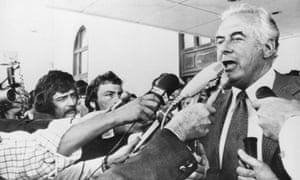Reading the palace letters reminded me of a matter that played out
behind the scenes on 11 November 1975, as Papua New Guinea transitioned
to independence
• Read the palace letters in full
• ‘Better for Her Majesty not to know’: palace letters reveal Queen’s role in sacking
• Read the palace letters in full
• ‘Better for Her Majesty not to know’: palace letters reveal Queen’s role in sacking
It is a small matter in the momentous events of 11 November 1975, but one that returns to my mind on reading the correspondence from the time between the Queen’s official secretary and the Australian governor general.
The Australian constitutional crisis was played out over the months of Papua New Guinea’s transition to and early weeks of independence. Treasurer Bill Hayden was closely familiar with Papua New Guinea and sympathetic to the huge responsibility that its leaders had accepted in leading their country into a great unknown. At the same time, he was seeking to restore some coherence into a budget that had lurched out of control under his predecessors.
The Hayden budget in August – the fulcrum of the constitutional
crisis – had announced without warning a large cut in Australian
development assistance to Papua New Guinea’s first budget. It had
deducted from the development assistance transfers the considerable sums
that had been committed to retirement and severance payments to
Australian public servants. This reduced development assistance
transfers by an amount that represented a large proportion of the Papua
New Guinea budget revenues.The Australian constitutional crisis was played out over the months of Papua New Guinea’s transition to and early weeks of independence. Treasurer Bill Hayden was closely familiar with Papua New Guinea and sympathetic to the huge responsibility that its leaders had accepted in leading their country into a great unknown. At the same time, he was seeking to restore some coherence into a budget that had lurched out of control under his predecessors.
The PNG prime minister Michael Somare called his Australian counterpart and asked for a meeting to review this deeply disruptive development on the eve of independence – scheduled for 16 September 1975. Gough Whitlam and his foreign affairs minister Don Willesee welcomed to Kirribilli House their counterparts, Somare and Albert Maori Kiki. The PNG minister for finance Julius Chan attended, but not the Australian treasurer. Hayden sent his assistant treasurer, Frank Stewart, with instructions to say nothing and to give no ground. The PNG ministers were accompanied by principal private secretary to the prime minister Rabbie Namaliu, secretary for finance Mekere Morauta, secretary for foreign affairs and trade Tony Siaguru, and me – in my role as first assistant secretary working for the secretary for finance on financial and economic policy.
The Papua New Guinea ministers had an unassailable case. “You have put your argument well,” the Australian prime minister summed up, “But I am afraid what you have said has fallen on deaf ears.”
The Papua New Guinea ministers and officials were devastated. Kiki shared his opinion of Whitlam to reporters gathered at the gates of Kirribilli House, and was rewarded with full-page headlines in the Daily Mirror that afternoon.
Hayden was made aware of the seriousness of his misjudgement. The budget could not be changed – it was, after all, the subject of the greatest parliamentary contest in three-quarters of a century of Australian federation. But he would be helpful in other ways. The Papua New Guinea independent currency was due to be separated from the Australian dollar at the end of the year, and Australia would provide a swap facility to ensure its stability.
Chan conferred on the offer with Morauta and me. I was instructed to travel to Canberra to persuade the treasurer that the currency swap would not substitute for the reduced development assistance. Something else would have to be done.
“Tell Bill Hayden to shove the currency swap up his arse,” was my elegant instruction from the minister. “But not so far that we can’t find it if we need it.”
The Australian treasurer wanted to be helpful. We talked through the possibilities and discussed a transfer of reserves that reflected Papua New Guinea’s view on the contribution that PNG had made to the joint monetary system from the beginning. It was agreed that the matter would be settled in a phone call between the Australian treasurer and the PNG minister for finance at 1pm Canberra time, noon in Port Moresby, on 11 November.
Late on the morning of 11 November, I was in the office of the commissioner for taxation discussing some taxation policy matters. The phone rang. Mekere was on the line. “Come back to the office quickly,” he said. “Something terrible has happened.”
Mekere was with the minister when I arrived back in the office. We all pondered the remarkable turn of events.
Julius was deep in thought, then looked up.
“The governor general is the Queen’s representative in Australia,” said Julius. “She is our Queen too. What her representative has done has greatly damaged her loyal subjects in this country. Her PNG ministers will ask her to adjust her representative’s decision on the matter that affects us.”
“Mekere, Ross,” said Julius. “When they wake up, ring Buckingham Palace and ask the Queen to authorise her old Australian ministers to take one decision, that is so important to her PNG ministers.”
It was clear that Julius was serious. We obtained the number of the Queen’s private secretary from Government House in Port Moresby. We called London late in the Port Moresby day and asked for the message to be given to the Queen. The Queen’s principal private secretary rang back 48 hours later.
“The Queen has considered the minister’s request,” he said. “On this matter, she will take the advice of her Australian ministers.”

No comments:
Post a Comment